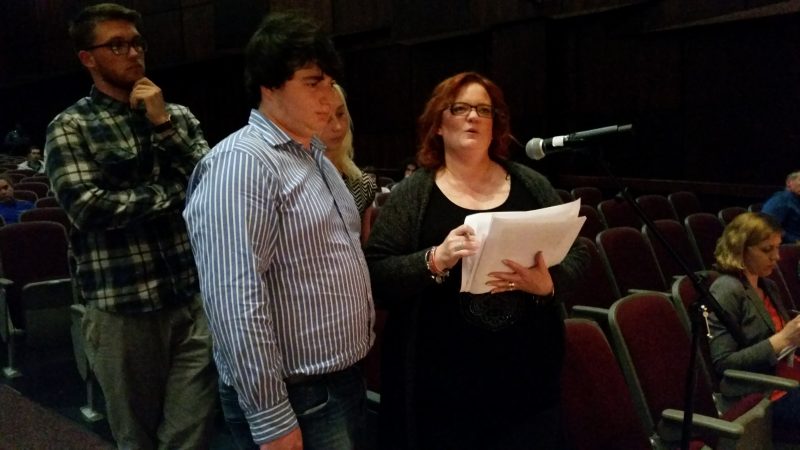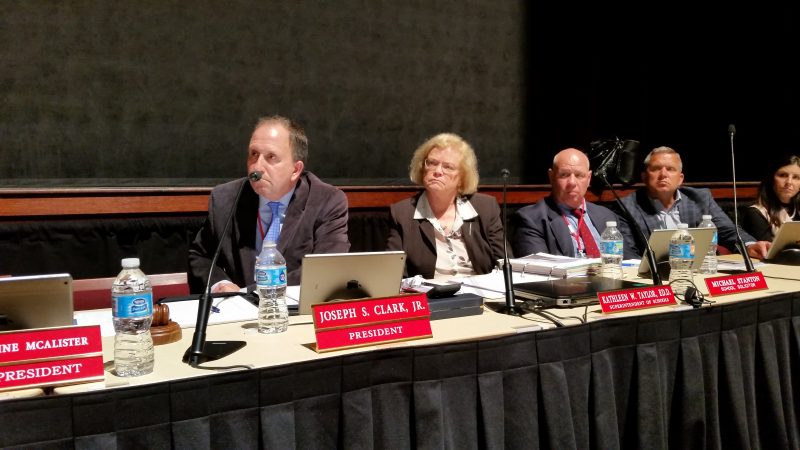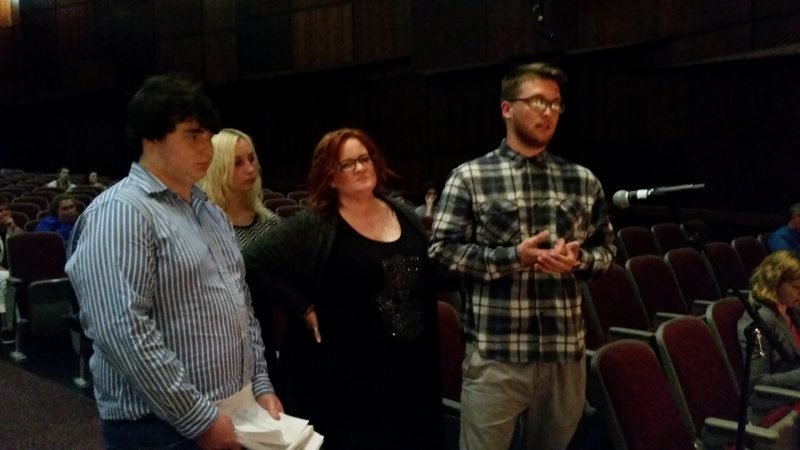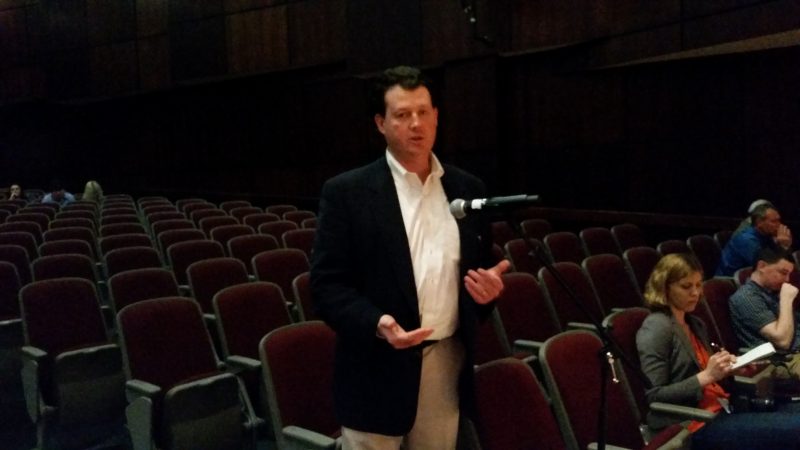Councilman Michael DeVlieger proposed creating a drug-prevention program that would allow students to voluntarily take drug tests three times a year and reward them with incentives for staying clean.
 By Donald Wittkowski
Ever since her 22-year-old son, Tyler, died of a heroin overdose in March, Ocean City resident Sally Onesty has been helping other drug abusers to get into treatment programs.
One of them is Dylan Craver, a former Ocean City High School star athlete who said he began taking the powerful painkillers OxyContin and Percocet when he was just 16 years old and later became hooked on heroin.
Standing side-by-side, Onesty and Craver made an impassioned public appeal to the Ocean City Board of Education on Wednesday night to focus attention on what they say is the community’s growing drug crisis.
Onesty urged the board members to confront the drug problem head-on, telling them, “Please don’t isolate this town or this district.”
At the same time, she assured them that she had no intention to criticize or “bash the board.” She said she was seeking their help because they are in a position to “make a difference in a kid’s life.”
“So please share his story to save a life,” Onesty said, referring to her son, who graduated from Ocean City High School in 2012.
Joseph S. Clark Jr., the Board of Education president, told Onesty that the school district is committed to fighting the drug problem with her, declaring, “We can do better. We will do better.”
“We have heard you. We haven’t buried our heads,” Clark said to Onesty.
By Donald Wittkowski
Ever since her 22-year-old son, Tyler, died of a heroin overdose in March, Ocean City resident Sally Onesty has been helping other drug abusers to get into treatment programs.
One of them is Dylan Craver, a former Ocean City High School star athlete who said he began taking the powerful painkillers OxyContin and Percocet when he was just 16 years old and later became hooked on heroin.
Standing side-by-side, Onesty and Craver made an impassioned public appeal to the Ocean City Board of Education on Wednesday night to focus attention on what they say is the community’s growing drug crisis.
Onesty urged the board members to confront the drug problem head-on, telling them, “Please don’t isolate this town or this district.”
At the same time, she assured them that she had no intention to criticize or “bash the board.” She said she was seeking their help because they are in a position to “make a difference in a kid’s life.”
“So please share his story to save a life,” Onesty said, referring to her son, who graduated from Ocean City High School in 2012.
Joseph S. Clark Jr., the Board of Education president, told Onesty that the school district is committed to fighting the drug problem with her, declaring, “We can do better. We will do better.”
“We have heard you. We haven’t buried our heads,” Clark said to Onesty.
 Board of Education President Joseph S. Clark Jr., left, and other school officials listen to Onesty's remarks.
In the weeks following her son’s death, Onesty took on the role of drug-prevention advocate and began reaching out to drug abusers in hopes of getting them treatment. She noted it wasn’t hard to find them. She simply looked in Tyler’s phone and saw their names and numbers.
Craver, who acknowledged he was one of Tyler’s drug friends, told the board members he has been sober for 37 days and is preparing to move into a drug-rehab center thanks to Sally Onesty’s help.
The 21-year-old Craver, who graduated in 2014, was a standout Ocean City baseball and football player before his drug addiction ruined his chances of winning a college scholarship. In an extraordinary public admission, he told the school board of his struggles with alcohol, marijuana, opioids and, ultimately, heroin.
“Once you’re addicted, it’s hard to realize it,” he said.
With Onesty standing next to him, Craver warned the school board members that the local drug problem may be far more serious than they realize.
“Knowing what’s in this school scares me,” he said.
Board of Education President Joseph S. Clark Jr., left, and other school officials listen to Onesty's remarks.
In the weeks following her son’s death, Onesty took on the role of drug-prevention advocate and began reaching out to drug abusers in hopes of getting them treatment. She noted it wasn’t hard to find them. She simply looked in Tyler’s phone and saw their names and numbers.
Craver, who acknowledged he was one of Tyler’s drug friends, told the board members he has been sober for 37 days and is preparing to move into a drug-rehab center thanks to Sally Onesty’s help.
The 21-year-old Craver, who graduated in 2014, was a standout Ocean City baseball and football player before his drug addiction ruined his chances of winning a college scholarship. In an extraordinary public admission, he told the school board of his struggles with alcohol, marijuana, opioids and, ultimately, heroin.
“Once you’re addicted, it’s hard to realize it,” he said.
With Onesty standing next to him, Craver warned the school board members that the local drug problem may be far more serious than they realize.
“Knowing what’s in this school scares me,” he said.
 Dylan Craver, right, a 2014 Ocean City High School graduate, told the school board about his spiral into drug addiction.
Onesty, 46, the owner of A Bella Salon & Spa in Ocean City, wants the local schools to be part of a communitywide coalition of parents, students, the police, churches, hospitals and government officials to address the drug crisis.
On Tuesday, Onesty met privately with Mayor Jay Gillian, Police Chief Chad Callahan, Superintendent of Schools Kathleen Taylor and members of City Council and the Board of Education to begin plotting strategy.
Dylan Craver, right, a 2014 Ocean City High School graduate, told the school board about his spiral into drug addiction.
Onesty, 46, the owner of A Bella Salon & Spa in Ocean City, wants the local schools to be part of a communitywide coalition of parents, students, the police, churches, hospitals and government officials to address the drug crisis.
On Tuesday, Onesty met privately with Mayor Jay Gillian, Police Chief Chad Callahan, Superintendent of Schools Kathleen Taylor and members of City Council and the Board of Education to begin plotting strategy.
 Councilman Michael DeVlieger proposed creating a drug-prevention program that would allow students to voluntarily take drug tests three times a year and reward them with incentives for being drug-free. The effort would focus on preventing the kids from every trying drugs.
Ocean City Councilman Michael DeVlieger, another speaker during the school board meeting, lamented that children have easy access to illicit drugs.
“Today, it’s easier for a kid to get heroin than a beer,” he said.
DeVlieger proposed creating a community-based, drug-prevention program that would allow students to voluntarily take drug tests three times a year and reward them with cash or other prizes for staying clean.
“I think the community has to come together,” he said.
DeVlieger also told the school board that drug-sniffing dogs should be used to search students’ lockers three or four times a year, conducted in the off hours with one day notice to all of the parents and guardians.
Onesty expressed concern that the use of drug-sniffing dogs in schools would harm the relationship that police are trying to establish with students in the fight against drug addiction. But she did say she supported drug testing.
She noted that drug testing was part of the efforts by her family to save Tyler. Starting in 2014 and continuing to 2016, Tyler was placed in drug rehabilitation centers in New Jersey, Florida and California. Still, he couldn’t shake the addiction that would eventually kill him.
He was found dead in an Atlantic City motel room on March 7, just days after he was kicked out of a local halfway house for refusing to take a drug test.
Onesty’s decision to go public about Tyler’s addiction began when the family chose to livestream his memorial service on Facebook. His obituary disclosed that he died “from a heroin overdose, after a hard battle with addiction.”
Councilman Michael DeVlieger proposed creating a drug-prevention program that would allow students to voluntarily take drug tests three times a year and reward them with incentives for being drug-free. The effort would focus on preventing the kids from every trying drugs.
Ocean City Councilman Michael DeVlieger, another speaker during the school board meeting, lamented that children have easy access to illicit drugs.
“Today, it’s easier for a kid to get heroin than a beer,” he said.
DeVlieger proposed creating a community-based, drug-prevention program that would allow students to voluntarily take drug tests three times a year and reward them with cash or other prizes for staying clean.
“I think the community has to come together,” he said.
DeVlieger also told the school board that drug-sniffing dogs should be used to search students’ lockers three or four times a year, conducted in the off hours with one day notice to all of the parents and guardians.
Onesty expressed concern that the use of drug-sniffing dogs in schools would harm the relationship that police are trying to establish with students in the fight against drug addiction. But she did say she supported drug testing.
She noted that drug testing was part of the efforts by her family to save Tyler. Starting in 2014 and continuing to 2016, Tyler was placed in drug rehabilitation centers in New Jersey, Florida and California. Still, he couldn’t shake the addiction that would eventually kill him.
He was found dead in an Atlantic City motel room on March 7, just days after he was kicked out of a local halfway house for refusing to take a drug test.
Onesty’s decision to go public about Tyler’s addiction began when the family chose to livestream his memorial service on Facebook. His obituary disclosed that he died “from a heroin overdose, after a hard battle with addiction.”